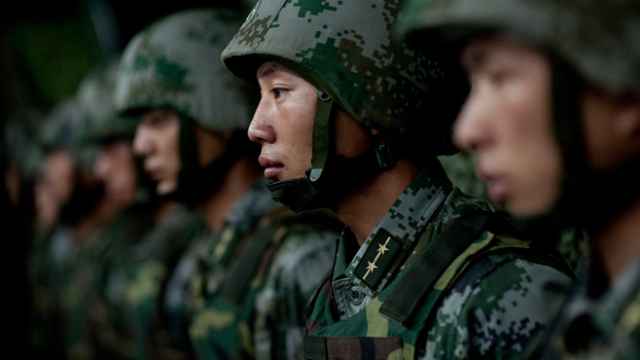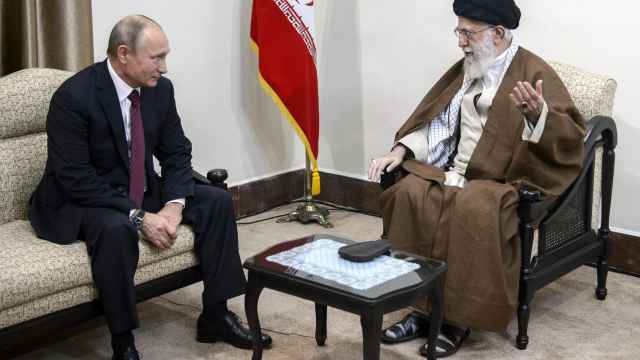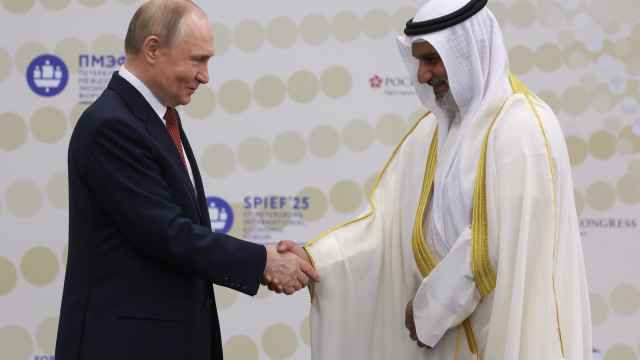Russia and Pakistan on Thursday signed their very first military cooperation agreement and laid out future avenues of cooperation, ending years of division over Islamabad's close military ties with the U.S. and Moscow's with India.
Sergei Shoigu, the first Russian defense minister to visit Pakistan since 1969, characterized his meeting with counterpart Khawaja Asif as an important step in strengthening ties between Moscow and Islamabad.
"During the meeting we agreed that bilateral military cooperation should take on a more practical orientation and enhance the combat capability of our armed forces," news agency TASS quoted Shoigu as saying after the meeting.
Although the concrete terms of the agreement are not publicly known, Shoigu said joint naval exercises will be a key feature of future cooperation with Pakistan, as well as military officer exchanges, arms sales and counternarcotics and counterterrorism cooperation.
Behind the scenes, Shoigu may have been negotiating an important sale of Mi-35 transport helicopters to Pakistan, Yury Barmin, an expert on Russian arms sales, told The Moscow Times.
Russia approved the delivery of 20 Mi-35s to Pakistan in November, but the details still have to be negotiated, "which is probably one of the reasons why Shoigu is traveling to Pakistan a week after this informal approval was issued by Moscow," Barmin said.
But more important than specific defense contracts are Russia's growing strategic interests in the region, driven by security concerns shared with Pakistan — such as instability in Afghanistan following the withdrawal of U.S. troops and counterterrorism and counternarcotics efforts.
Nonetheless, Moscow will play it safe to ensure that its moves do not anger India, Russia's main strategic partner in the region, said Pyotr Topychkanov, an analyst at the Carnegie Moscow Center.
Regional Interests
India last year purchased $3.8 billion worth of Russian arms — far ahead of the $981 million worth it purchased from the U.S., according to data from the Stockholm International Peace Research Institute (SIPRI).
Last year Russia's recorded exports to Pakistan were much more limited, valued at a mere $22 million, according to SIPRI. The total sum is somewhat higher than this, as Russia also sells arms to Pakistan through China.
Pakistan's reconciliation with India after decades of animosity and periodic conflict has provided a window of opportunity for Moscow to expand its relationship with Islamabad.
But according to Topychkanov, a strong relationship with India has to remain Russia's focus in the region. "Our cooperation with Pakistan should be very specific and limited, while our cooperation with India should be much more strategic," he said.
Security
Shared security interests are also drawing Pakistan and Russia closer together, as evidenced by Shoigu's announcement that joint military exercises and security cooperation will become a routine feature of their bilateral relationship.
"The main purpose of these exercises is to share experience in counterterrorism, counternarcotics and anti-piracy," Topychkanov said.
According to Barmin, the key concern driving Moscow to court Islamabad is the alarming flow of narcotics out of Afghanistan.
"Forty percent of Afghan drugs travel by sea, and a lot of it ends up in Russian ports," Barmin said.
Also at play is Pakistan and India's possible ascension next year to the Shanghai Cooperation Organization, an economic and military organization comprising Russia, China and several other Central Asian states.
"In the run-up to the SCO's summit in Ufa in July 2015, Russia will be courting the two countries … and will avoid doing controversial things, such as active defense cooperation with Islamabad," Barmin said.
Contact the author at [email protected]
A Message from The Moscow Times:
Dear readers,
We are facing unprecedented challenges. Russia's Prosecutor General's Office has designated The Moscow Times as an "undesirable" organization, criminalizing our work and putting our staff at risk of prosecution. This follows our earlier unjust labeling as a "foreign agent."
These actions are direct attempts to silence independent journalism in Russia. The authorities claim our work "discredits the decisions of the Russian leadership." We see things differently: we strive to provide accurate, unbiased reporting on Russia.
We, the journalists of The Moscow Times, refuse to be silenced. But to continue our work, we need your help.
Your support, no matter how small, makes a world of difference. If you can, please support us monthly starting from just $2. It's quick to set up, and every contribution makes a significant impact.
By supporting The Moscow Times, you're defending open, independent journalism in the face of repression. Thank you for standing with us.
Remind me later.






